mark mclaughlin
FOUR-LETTER WORD BEGINNING WITH 'F'
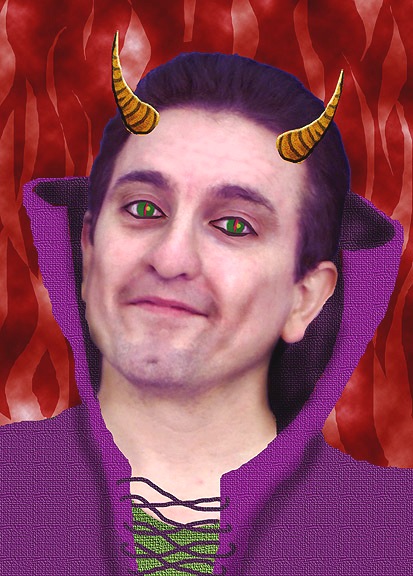
Mark McLaughlin's fiction, nonfiction and poetry have appeared in hundreds of magazines, newspapers, websites, and anthologies, including Galaxy, Black Gate, Cemetery Dance, Midnight Premiere, Dark Arts, In Laymon's Terms, and two volumes each of The Best of the Rest, The Best of HorrorFind, and The Year's Best Horror Stories (DAW Books).
McLaughlin's latest book is the story collection, Raising Demons For Fun and Profit, published by Sam's Dot Publishing and available at www.GenreMall.com (look in the Anthologies section). Other collections of his fiction include Motivational Shrieker, Slime After Slime, and Pickman's Motel from Delirium Books; At the Foothills of Frenzy (with co-authors Shane Ryan Staley and Brian Knight) from Solitude Publications; and Twisted Tales For Sick Puppies from Skullvines Press. GravesideTales.com is the home of his blog, Time Machine of Terror!
With collaborator Michael McCarty, he has written Monster Behind the Wheel (Delirium Books/Corrosion Press), Attack of the Two-Headed Poetry Monster (Skullvines Press), All Things Dark and Hideous (Rainfall Books, England), and Professor LaGungo's Delirious Download of Digital Deviltry and Doom (Darkside Digital). Also, he is the co-author, with Rain Graves and David Niall Wilson, of The Gossamer Eye, which won a Bram Stoker Award for Superior Achievement in Poetry.
To find out more about McLaughlin's work, visit www.myspace.com/monsterbook, www.skullvines.com, and www.Horror-Mall.com (enter McLaughlin into the Mall's search engine).
Mephistophobia:
Or, The Devil Goes Hollywood
Welcome once again to my diabolical domain, wherein we discuss how fear (the ultimate four-letter word beginning with 'F') is manifested in the cinema of the macabre.
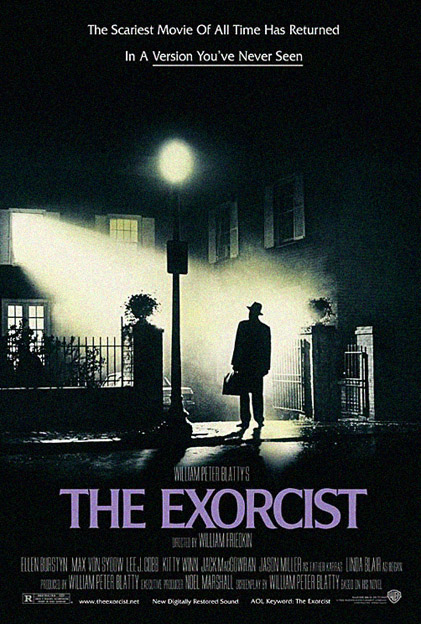
Today's phobia, Mephistophobia or fear of the Devil, could very well be the oldest fear of all, if we are to take the Bible literally.
Back in the Garden of Eden, Adam and Eve didn't have a care in the world. Their days and nights were spent in delightful pastoral bliss. The only rule of the house was simply this: Don't eat the fruit of the Tree of Knowledge. An easy rule to obey, really.
But then, along came that old Serpent, a.k.a. the Devil, tempting Eve with mouth-watering recipes for Forbidden Apple Pie. Before you know it, Adam and Eve defied God by eating the fruit. Soon they're busted, disgraced, evicted and basically, live crappily ever after.
So who the heck is this Devil fellow, anyway? It seems he used to be one of God's angel buddies, but he just didn't see eye to celestial eye with the Big Guy. They parted company and the Devil became the villain in the ongoing soap opera known as life on Earth.

All those developments leave a lot of unanswered questions. God created Adam and Eve and the angel who would go on to become the Devil. So why did He create beings that were capable of defying Him? He's all-powerful, so He could have weeded out that trait. Why did He plant the Tree of Knowledge in the first place -- and give it such a cool name? Why did He allow the Devil access to the Garden of Eden?
Why did God set up his creations to fail? And why didn't He forgive them or give them a second chance after they messed up? We all know that if one is to learn, one must make mistakes. Also, why didn't the children of Adam and Eve get a shot at life in the Garden?
It seems pretty mean to condemn an entire race of beings to substandard living conditions just because their earliest ancestors had a sweet tooth one afternoon.
Do I have definitive answers to these questions? Of course not. I wasn't there! I can only speculate on possible answers.
Why wouldn't a perfect being create a race of perfect creatures to inhabit His universe? Because of limitations, either extant or self-imposed. But if God is all-powerful, He could override any extant limitations, so they would have to be self-imposed.
And if God has self-imposed limitations, it would stand to reason that the Devil... who used to hang out with Him... would know about them, and would try to take advantage of them whenever possible.
If God did impose limitations, He would not be doing so for His own safety, since He's all-powerful. So apparently they would be imposed for the benefit of His creations. But these limitations bring about conflict. What kind of creations benefit from conflict?
Let's think about this. What ARE God's creations? Each one is a living being that begins, experiences complications as it progresses through time, and eventually ends -- just like a story.
And you can't have a story without conflict.
Does that mean life on Earth is like one big network, filled with millions and millions of soap operas -- the living stories of God's individual creations? If so, that would explain the Devil's presence, since all soap operas need villains.
Maybe Shakespeare was right when he wrote, "All the world's a stage, and all the men and women merely players..."
Let's take a look at some movies that feature fear of the Devil, and see what we can learn from them.

In Lisa and the Devil, the Devil is played by suave, sexy Telly Savalas, baby! Like Telly, the Devil sucks lollipops, flirts with the ladies and cracks wise. And to this debonair Devil, humans are literally puppets to be carried around and arranged in amusing tableaus.
In the opening sequence, a pretty tourist played by Elke Sommer sees an ancient fresco depicting the Devil carrying away the dead. Next she visits a quaint old shop where, lo and behold, a guy who looks just like the fresco-Devil is having a mannequin repaired. Later, she is given a ride by a passing limousine that takes her to a mansion where the butler is... yikes! That devilish fellow she met in the shop!
Practically everyone our pretty traveler meets has some adulterous secrets, and soon she is tangled in the madcap marionette-strings of their lives. And who's pulling those strings? I'll give you a hint: he looks like Telly Savalas. Guess life is one big puppet show, baby!
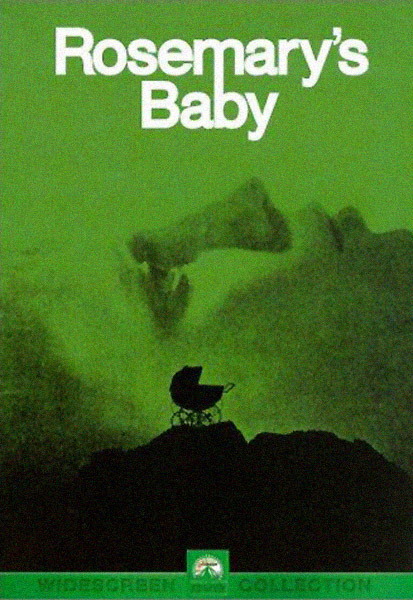
In Rosemary's Baby, an apartment building filled with senior Devil-worshippers welcomes a young couple into their wicked lair. Soon the oldies-but-baddies have pimped out the young housewife, Rosemary, as Lucifer's baby-mama.
Rosemary is drugged up for the ritualistic conception and thinks it's all just one big kooky dream. How's that for a Satanic soap opera? At first she is horrified when she learns the truth. But then she sees the baby... True, the little one has his daddy's eyes, but Rosemary is a loving mother, and love can and will always find beauty and goodness in the beloved... even if it isn't there.
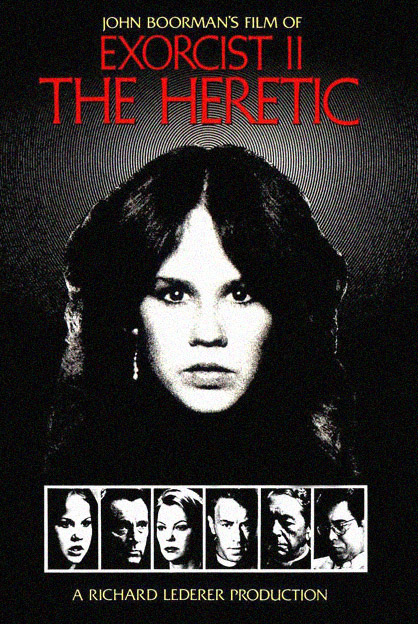
In The Exorcist and The Exorcist II: The Heretic, the Devil needing to be exorcized is an African entity named Pazuzu. The symptoms of possession, as manifested by his victim Regan, are many and varied. She croaks and screams and curses, vomits noxious substances, develops skin lesions that give her a grotesque appearance, and much more.
Hmmmm, being possessed sure is a noisy, showy state of affairs. In fact, it's a regular theatrical production. The Devil sure knows how to hold the attention of an audience...
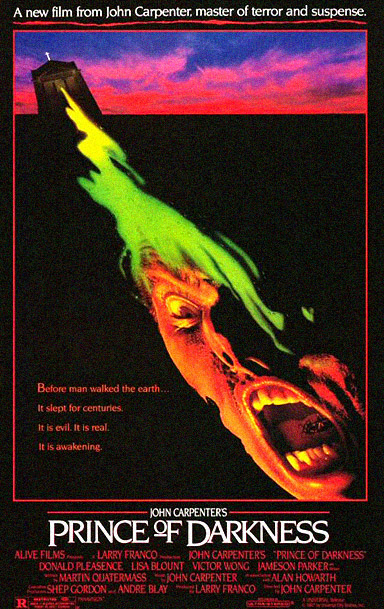
John Carpenter's Prince of Darkness has a deliriously original and startling premise. We discover that the Anti-Christ exists in our dimension as a pool of watery green goo, trapped in a huge glass cylinder, where it has been hidden and guarded for centuries by a secret religious order. The goo is waiting to escape so it can inhabit a human host. That's when the horror really begins.
Once the goo enters a young woman, it bonds with her to become a horrid new festering life-form. It then strives to set free its father, Satan, who is trapped in a parallel dimension. How do we know all this? Well, people from the future are broadcasting all this information into the sleeping minds of the present-day characters. See? Even in the future, the Devil is intent on getting screen time -- even in people's dreams!
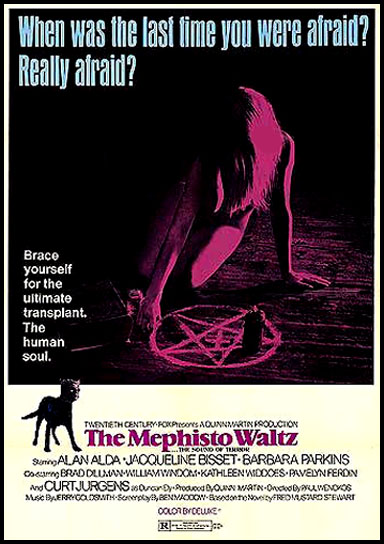
In The Mephisto Waltz, Alan Alda plays a failed-pianist-turned-music-journalist who interviews the world's greatest pianist, an older fellow named Duncan Ely, who happens to be a Satanist. Duncan looks at the journalist's hands and realizes that the young man has one-in-a-million master-pianist hands, like his own. So naturally, he decides to take over the young man's body to continue his career as a concert pianist. Like his master, the Devil, this fervent follower is all about show biz.
So, the evil pianist and his incestuous daughter/lover use a magic book, a plaster-of-paris mask, a blood sample from the young guy, and some mystic blue oil to transfer the old guy's soul into his new body. But, there's one thing... or rather, person... they'd overlooked: the journalist's wife. She figures out the whole scheme, makes a new deal with the Devil, and pulls a switcheroo of hellish proportions.
So is the Devil really just a wheeler-dealer? The Canadian movie-musical The Apple seems to agree with that notion. In this over-the-top yet low-budget-bordering-on-chintzy rock opera, Satan is a flamboyant music producer named Mr. Bugaloo, and in hilarious musical number after number after number, we are informed that the Devil loves to bargain, and that showbiz and Satanism are pretty much synonymous.
We see characters happily selling their souls to the Devil in exchange for juicy recording contracts, not to mention non-stop sex, drugs and booze. My only question is: Is this a movie or a documentary?
So with all this in mind, what sort of path should one follow to avoid the Devil and his temptations? If all the world's a stage and Satan has script approval, how can you keep from being drawn into his storylines?
Well, AVOIDING the Devil won't do you any good. Lisa tried to do that in Lisa and the Devil, but he only saw her as a challenge and chased her down. The same goes for FIGHTING the Devil. The Exorcist died trying that to do just that. You can join with the Devil, like the journalist's wife inThe Mephisto Waltz, but you know that relationship will only sour with time.
There's really only one thing that these movie characters never do in their interactions with the Devil, and it's the same thing God didn't do when Satan rebelled, or when Adam and Eve nibbled on that taboo produce: namely, forgive the transgression and move on.
Movie characters never forgive and forget because it's pretty darned anti-climactic. But, it's a good path for living a trouble- and evil-free life. Don't hold grudges or seek vengeance or hold mystic rituals with blue oil and plaster-of-paris masks. Have a forgiving nature, realize that we all have our shortcomings, misunderstandings happen... and move on. Don't add needless complications to the storyline of your life.
Of course, if somebody's trying to kill you, it's okay to fight back and call the cops! I mean, it's good to forgive, but do practice self-preservation!
END















